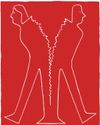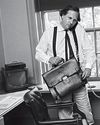CATEGORIES
Kategorier
Nyste historier

Hatagaya Lore Bryan Washington
We moved to Tokyo from Dallas because of my husband's job, an unexplainable tech gig.

CHARACTER STUDIES
“Purpose” on Broadway and “Vanya” downtown.

HOME SLICE
The making of an Indian American specialty.

A MATTER OF FACTS
On the loss of two sons.

THE ELEMENTS OF STYLE, 2025
Reliable news coverage has never been more important than it is now. Journalists must remain vigilant and rigorous in the face of a second Trump Administration. To help them do so, we are releasing an updated version of Strunk and White’s “Elements of Style.” Please refer to the following examples when writing and reporting, for as long as that’s still allowed.

LANDSCAPE MODE
Dirty Projectors' symphony for a burning world.

CHORAL HISTORY
“The Alto Knights.”

BEYOND THE CURVE
In medicine and public health, we cling to universal benchmarks—at a cost.

DO YOU KNOW JESUS?
Why the Gospel stories won’t stay dead and buried.

Richard Brody on Pauline Kael's "Notes on Heart and Mind"
When Pauline Kael joined The New Yorker’s staff as a movie critic, in January, 1968, the world of cinema was undergoing drastic change.

COMMUNITY PROPERTY
Who gets to determine the meaning of divorce?

OPEN SECRET
Why did police let one of America's most prolific predators get away for so long?

What's French for 'Steakhouse'?
Daniel Boulud takes on America's burliest restaurant genre at La Tête d'Or.

Born This Way
Mother Monster throws her whole self into the pot.

My Own Private Avignon Claude Noëlle Toly's 275-square-foot studio feels worlds away from Bleecker Street.
studio feels worlds away from

156 MINUTES WITH...Sean Manning
The new publisher of Simon & Schuster's main imprint is looking to Chicken Shop Date for inspiration.

Rogue Rite of Spring
Two anonymous climbers take to the sky on the Upper West Side.

A Death-Defying SEX CAPADE
MICHELLE WILLIAMS stars in a new FX show as a horny stage-four cancer patient on a quest to finally FIGURE OUT WHAT TURNS HER ON.

Married to the Job
A slick thriller makes monogamy look hot.

FAKE CENTENARIANS, FAULTY DATA, JUNK SCIENCE, AND CONTESTED "BLUE ZONES."
DEMOGRAPHERS AT WAR

This Is Fascism - The U.S. is starting to resemble El Salvador's brutal regime.
When President Nayib Bukele of El Salvador eagerly volun- teered to receive 261 deportees the Trump administration had possibly illegally airlifted from the U.S. in mid-March, he instantly became one of the biggest stars in American conservative politics.

COVID's Legacy of Judginess
We spent so much time calling people out— and never stopped.

Severance's Biggest Wild Card
Britt Lower had to deepen the war within her character(s) in the show’s second season.

Completely New Pho
The pho Nam Dinh is hot and homemade at chef Nhu Ton’s shop near Union Square.

John Mulaney's Playhouse
On his new live talk show, the comedian can do whatever he wants. What exactly is that?

Brick Is Back
Even prolific builders of glass towers have rediscovered clay’s texture, shadow, and drama.

Fast Car
Nuance and vulnerability sing in a visiting Tennessee Williams adaptation.

My Vanity Fair Hazing
The staff hated me. The advertisers were in revolt. And the tabloids were saying my days were numbered before I had even begun. How on earth would I survive?

SIEMENS SLASHES 6,000 JOBS: AUTOMATION AND EV CHARGING UNITS FACE THE AXE
Siemens AG, a titan in industrial engineering, dropped a bombshell on March 18, 2025, announcing plans to cut 6,000 jobs worldwide across its automation and electric vehicle (EV) charging divisions.

RESIDENT EVIL 3 LURCHES ONTO IPHONE, IPAD, AND MAC: HORROR GOES MOBILE
Capcom has unleashed a chilling treat for survival horror fans, bringing Resident Evil 3 to iPhone, iPad, and Mac on March 18, 2025, as announced via the App Store.
